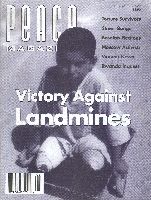
Peace Magazine Nov-Dec 1997, page 30. Some rights reserved.
Search for other articles by Jean Smith here
WHEN STANLEY Knowles died, it was implied that the idea of the social gospel had died with him. Not so: it is alive and well, and Bill Blaikie's eloquent paper reminds us that it is needed now as much, if not more, than ever.
In the introduction Carl Ridd tells of how in 1977, in response to his mild criticism of the power of money to control life in its own interest, an executive of a very large international corporation phoned him, white hot with anger and fear, and said, "Business is getting tired of being the whipping boy of people like you. We are getting together, organizing. We'll show everyone how important we are. We will bury you." I think that's what globalization is all about.
Even the slightest familiarity with the devastating results of the machinations of the FTA, NAFTA, WTO, IMF and the World Bank has made people realize that whatever social and economic progress has been made in the past is being fast eroded by those agreements signed by our governments.
Blaikie outlines the development of social, health and labour legislation which benefited everyone and how they are now being destroyed by the free traders and the financial gurus who seem to have so many governments in thrall as they preach the gospel of the bottom line and globalization.
He talks about how the free trade agreements are really about breaking down communities and their supportive values and structures, so that control of our lives is vested in fewer and more distant hands. All this so that there will be fewer constraints on what Walter Tauschenbusch called "the lust for easy and unearned gain."
I recommend this booklet for individual reading but also as the focal point for discussion by a group of people concerned about the loss of the principles of the social gospel: justice, fairness, compassion and cooperation.
Reviewed by Jean Smith, Peace Magazine office manager

Peace Magazine Nov-Dec 1997, page 30. Some rights reserved.
Search for other articles by Jean Smith here